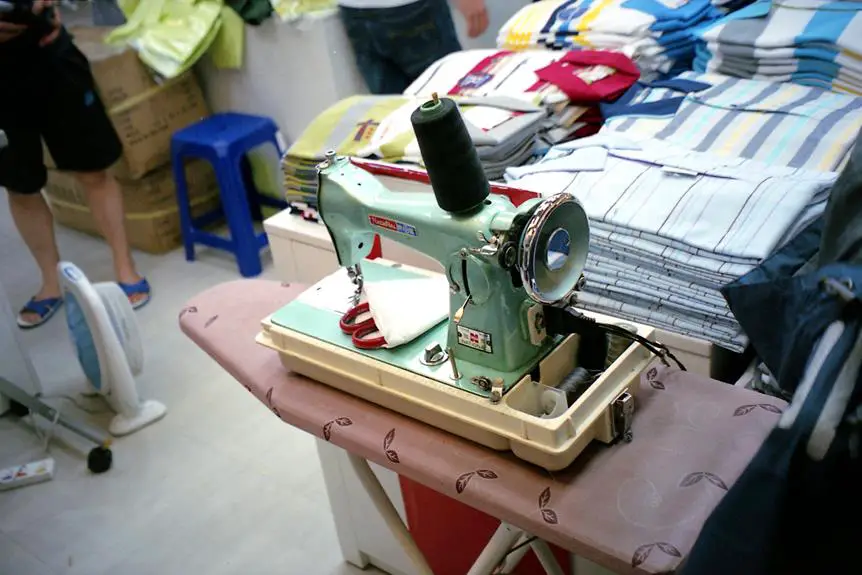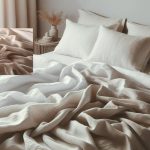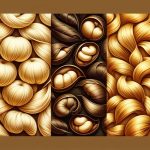When it comes to selecting the best fabrics for thread, you may find yourself pondering over various choices. However, with the right knowledge, you can confidently narrow down your options to the top 5 picks.
Each fabric possesses unique characteristics that determine its compatibility with different types of threads. Cotton, known for its versatility and durability, is a popular choice among sewing enthusiasts.
Silk, with its luxurious sheen and strength, is favored for delicate projects. Linen, valued for its natural fibers and breathable nature, is a go-to for many sewing projects.
Polyester, appreciated for its resilience and ease of care, is another top contender. Lastly, wool, renowned for its warmth and elasticity, rounds off the list of top fabrics for thread.
Key Takeaways
- Cotton and cotton blends are versatile and durable fabrics for thread, suitable for a wide range of sewing projects.
- Silk is a luxurious fabric prized for its lustrous appearance and smoothness, making it ideal for delicate projects.
- Linen is a rustic and durable fabric that complements a variety of fabrics, especially natural fibers, and is recommended for hemming, embroidery, and quilting.
- Polyester is a durable and versatile fabric that is highly resistant to UV rays, moisture, and chemicals, making it ideal for outdoor or heavy-duty projects.
Cotton
When choosing thread, consider using cotton for its versatility and durability. Cotton thread is a popular choice due to its strength and ability to withstand high tension, making it suitable for a wide range of sewing projects. It's also known for its excellent heat resistance, making it ideal for both hand and machine sewing.
Cotton blends, which combine cotton with other fibers such as polyester, provide added strength and flexibility, making them suitable for versatile sewing needs. Organic cotton properties make it an attractive option for those seeking an environmentally friendly and sustainable thread choice. Organic cotton is grown without the use of harmful chemicals, making it a natural and eco-friendly option for sewing projects. Threads made from organic cotton offer the same durability and versatility as conventional cotton threads, while also aligning with ethical and environmental considerations.
Whether opting for pure cotton thread or cotton blends, the versatility and durability of cotton make it a top choice for a wide range of sewing projects. Understanding the properties of both cotton and organic cotton can help you make an informed decision when selecting the best thread for your specific sewing needs.
Silk
For sewing projects requiring a luxurious touch and fine detail, silk thread is an excellent choice due to its smoothness and strength. Silk thread is prized for its lustrous appearance, making it perfect for high-end garments, delicate fabrics, and decorative stitching. Its natural elasticity and tensile strength allow for strong, durable seams, while its smooth texture reduces friction, preventing damage to delicate fibers. Additionally, silk thread is resistant to mildew and moths, making it ideal for heirloom pieces and long-lasting creations.
The benefits of silk thread are undeniable, but there are alternatives to consider. While polyester thread lacks the luxurious feel of silk, it offers exceptional strength and durability, making it suitable for a wide range of projects. Cotton thread, on the other hand, is a more affordable option that works well for everyday sewing and quilting. However, it may not provide the same level of finesse and strength as silk.
Ultimately, the choice between silk thread and its alternatives depends on the specific requirements of your project and the desired outcome you seek to achieve.
Linen
Linen thread brings a rustic charm and natural strength to sewing projects, making it a versatile choice for a variety of applications. Its durability and breathable quality make it well-suited for both functional and decorative stitching.
Linen thread properties:
- Natural Strength: Linen thread is renowned for its inherent strength, making it ideal for durable and long-lasting seams.
- Rustic Charm: Its slightly coarse texture adds a unique and rustic appeal to sewing projects.
- Breathable: Linen's breathable quality makes it suitable for sewing lightweight and breathable garments.
- Versatile: Linen thread is adaptable for a wide range of sewing applications, from hand-stitched hems to decorative embroidery.
- Natural Appearance: Its natural appearance complements a variety of fabrics, especially natural fibers like cotton and linen itself.
Recommended uses:
- Hemming: Use linen thread for hemming garments, especially those made from natural fabrics.
- Embroidery: Its rustic charm makes it perfect for adding decorative stitches to home linens and clothing.
- Quilting: Linen thread adds a touch of natural elegance to quilting projects.
Linen thread care, maintenance tips:
- Store in a cool, dry place to prevent mildew.
- Hand wash linen thread with mild detergent and air dry to maintain its natural strength and appearance.
Polyester
Polyester's durability and versatility make it an excellent choice for a wide range of sewing projects. Polyester thread is known for its exceptional durability, making it suitable for both hand and machine sewing. The synthetic nature of polyester gives it a high level of elasticity, allowing it to withstand stress and strain without breaking or stretching out of shape. This elasticity is particularly advantageous when sewing stretch fabrics or garments that require flexibility.
Polyester thread is also highly resistant to UV rays, moisture, and chemicals, making it an ideal choice for outdoor or heavy-duty projects. Its resistance to mildew and abrasion ensures that the thread maintains its integrity over time, even when subjected to harsh conditions. Additionally, polyester thread's colorfastness and ability to retain its vibrancy over time contribute to its versatility.
When selecting a thread for your sewing projects, consider the durability, elasticity, resistance, and versatility of polyester thread. These qualities make it a reliable option for a wide variety of applications, from apparel and accessories to home decor and outdoor gear.
Wool
When sewing with wool, it's important to choose a thread that complements the natural properties of this fabric. Wool blends beautifully with specific threads, enhancing the overall quality of your sewing projects. Consider the following when selecting a thread for wool:
- Natural Fibers: Opt for threads made from natural fibers such as cotton or silk to seamlessly blend with the wool fabric, ensuring a cohesive look and feel.
- Heavy-duty Threads: Due to the dense and sturdy nature of wool, using heavy-duty threads like topstitching or buttonhole thread can provide the necessary strength for durable seams and hems.
- Felting Techniques: If you're incorporating felting techniques into your wool projects, consider wool or wool-blend threads that can be easily melded into the fabric for a seamless finish.
- Contrast Stitching: Experiment with contrasting threads to create eye-catching topstitching or decorative embroidery on wool garments, adding a unique and stylish touch.
- Color Matching: Select threads that closely match the color of your wool fabric to ensure that the stitches seamlessly blend in, maintaining a refined and polished appearance.
Carefully choosing the right thread for your wool projects will elevate the quality and longevity of your creations, ensuring a professional and polished finish.
Frequently Asked Questions
Are There Any Specific Thread Types That Work Best With Each Fabric?
When choosing thread for different fabrics, it's crucial to match thread types with fabric properties to ensure durability and quality. Understanding sewing techniques for different fabric-thread combinations can help troubleshoot common issues and achieve professional results.
Can These Fabrics Be Used for Both Hand Sewing and Machine Sewing?
Yes, these fabrics can be used for both hand sewing and machine sewing. Consider fabric compatibility, thread type, and sewing considerations. Ensure thread durability by following care instructions for each fabric.
Are There Any Special Considerations to Keep in Mind When Sewing With These Fabrics?
When sewing with these fabrics, consider their compatibility with your sewing techniques and the properties of the fabric. It's important to take into consideration the fabric's stretch, weight, and weave for successful stitching.
How Do These Fabrics Compare in Terms of Thread Durability and Longevity?
When comparing durability and longevity, consider the fabric's thread type and sewing method. Sewing with different fabrics requires maintaining thread quality and following fabric care instructions. It's essential to match the thread to the fabric for optimal results.
Are There Any Specific Care Instructions for Maintaining the Quality of Thread Used With These Fabrics?
To maintain thread quality, follow specific care instructions based on fabric compatibility. Utilize proper sewing techniques to enhance longevity. Compare thread maintenance methods to determine the best approach for maintaining durability and longevity.
- Can You Get Organza Wet? - April 23, 2024
- Why Is Organza so Popular? - April 23, 2024
- What Do You Wear With Organza? - April 23, 2024








